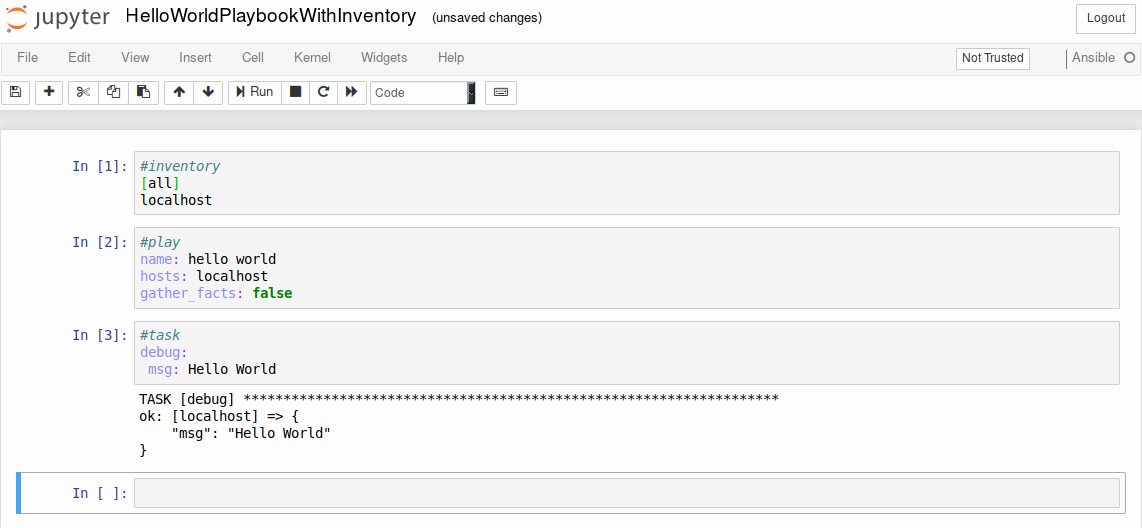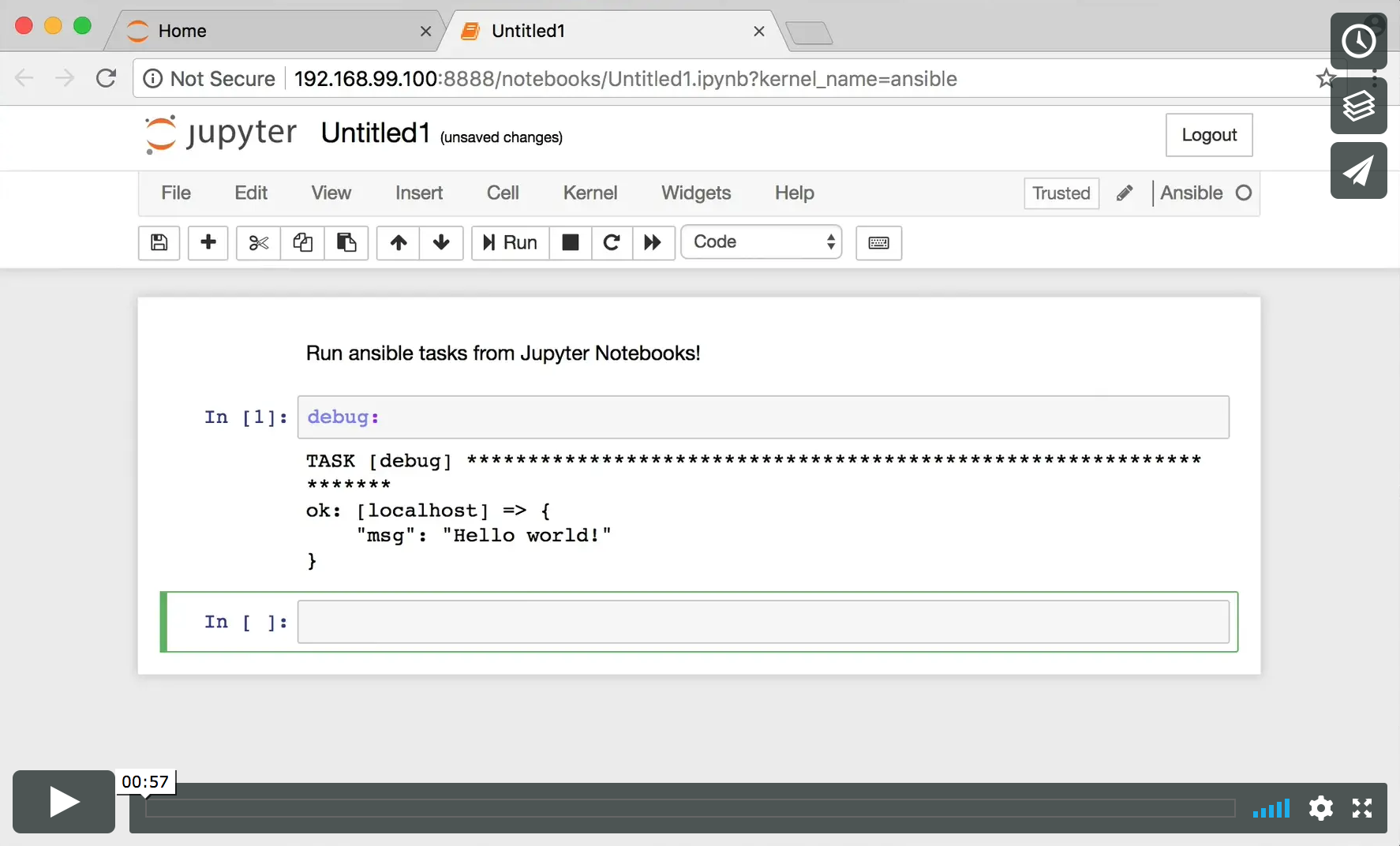https://github.com/ansible/ansible-jupyter-kernel
Jupyter Notebook Kernel for running Ansible Tasks and Playbooks
https://github.com/ansible/ansible-jupyter-kernel
Last synced: 6 months ago
JSON representation
Jupyter Notebook Kernel for running Ansible Tasks and Playbooks
- Host: GitHub
- URL: https://github.com/ansible/ansible-jupyter-kernel
- Owner: ansible
- License: other
- Created: 2018-06-26T14:28:02.000Z (over 7 years ago)
- Default Branch: master
- Last Pushed: 2022-02-11T15:18:34.000Z (over 3 years ago)
- Last Synced: 2025-03-29T01:13:28.693Z (6 months ago)
- Language: Python
- Homepage:
- Size: 1.35 MB
- Stars: 534
- Watchers: 20
- Forks: 62
- Open Issues: 18
-
Metadata Files:
- Readme: README.md
- Changelog: CHANGELOG.md
- Contributing: CONTRIBUTING.md
- License: LICENSE.md
- Code of conduct: CODE_OF_CONDUCT.md
Awesome Lists containing this project
- awesome-starred - ansible/ansible-jupyter-kernel - Jupyter Notebook Kernel for running Ansible Tasks and Playbooks (others)
- awesome-jupyter-resources - GitHub - 34% open · ⏱️ 11.02.2022): (Jupyter内核)
README
# Ansible Jupyter Kernel
[](https://travis-ci.com/ansible/ansible-jupyter-kernel)
[](https://mybinder.org/v2/gh/ansible/ansible-jupyter-kernel/master)

The Ansible [Jupyter](http://jupyter.readthedocs.io/en/latest/) Kernel adds a kernel backend for Jupyter to interface directly with Ansible and construct plays and tasks and execute them on the fly.
## Demo
[](https://vimeo.com/279049946 "Run Ansible Tasks from Jupyter Notebook - Click to Watch!")
## Table of Contents
* [Installation](#installation)
* [From pypi](#from-pypi)
* [From a local checkout](#from-a-local-checkout)
* [Usage](#usage)
* [Using the cells](#using-the-cells)
* [Examples](#examples)
* [Using the development environment](#using-the-development-environment)
## Installation:
`ansible-kernel` is available to be installed from pypi but you can also install it locally. The setup package itself will register the kernel
with `Jupyter` automatically.
### From pypi
pip install ansible-kernel
python -m ansible_kernel.install
### From a local checkout
pip install -e .
python -m ansible_kernel.install
### For Anaconda/Miniconda
pip install ansible-kernel
python -m ansible_kernel.install --sys-prefix
## Usage
### Local install
```
jupyter notebook
# In the notebook interface, select Ansible from the 'New' menu
```
### Container
docker run -p 8888:8888 benthomasson/ansible-jupyter-kernel
Then copy the URL from the output into your browser:
http://localhost:8888/?token=ABCD1234
## Using the Cells
Normally `Ansible` brings together various components in different files and locations to launch a playbook and performs automation tasks. For this
`jupyter` interface you need to provide this information in cells by denoting what the cell contains and then finally writing your tasks that will make
use of them. There are [Examples](#examples) available to help you, in this section we'll go over the currently supported cell types.
In order to denote what the cell contains you should prefix it with a pound/hash symbol (#) and the type as listed here as the first line as shown in the examples
below.
#### #inventory
The inventory that your tasks will use
```
#inventory
[all]
ahost ansible_connection=local
anotherhost examplevar=val
```
#### #play
This represents the opening block of a typical `Ansible` play
```
#play
name: Hello World
hosts: all
gather_facts: false
```
#### #task
This is the default cell type if no type is given for the first line
```
#task
debug:
```
```
#task
shell: cat /tmp/afile
register: output
```
#### #host_vars
This takes an argument that represents the hostname. Variables
defined in this file will be available in the tasks for that host.
```
#host_vars Host1
hostname: host1
```
#### #group_vars
This takes an argument that represents the group name. Variables
defined in this file will be available in the tasks for hosts in that
group.
```
#group_vars BranchOfficeX
gateway: 192.168.1.254
```
#### #vars
This takes an argument that represents the filename for use in later cells
```
#vars example_vars
message: hello vars
```
```
#play
name: hello world
hosts: localhost
gather_facts: false
vars_files:
- example_vars
```
#### #template
This takes an argument in order to create a templated file that can be used in later cells
```
#template hello.j2
{{ message }}
```
```
#task
template:
src: hello.j2
dest: /tmp/hello
```
#### #ansible.cfg
Provides overrides typically found in ansible.cfg
```
#ansible.cfg
[defaults]
host_key_checking=False
```
### Examples
You can find various [example notebooks in the repository](https://github.com/ansible/ansible-jupyter-kernel/tree/master/notebooks)
## Using the development environment
It's possible to use whatever python development process you feel comfortable with. The repository itself includes mechanisms for
using [pipenv](https://github.com/pypa/pipenv)
```
pipenv install
...
pipenv shell
```